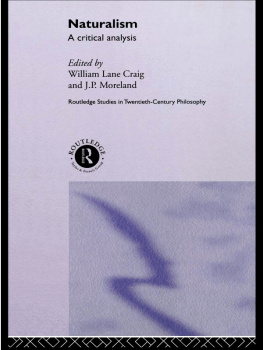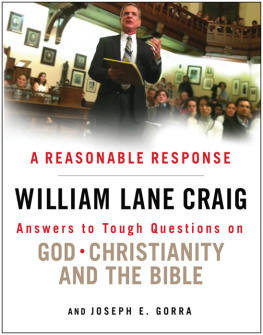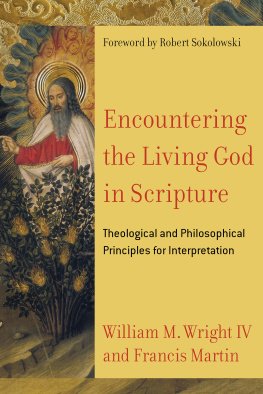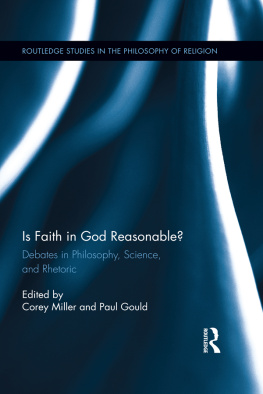God Is Great,
God Is Good
Why Believing in God Is Reasonable and Responsible
Edited by
William Lane Craig &
Chad Meister

www.IVPress.com/books
InterVarsity Press
P.O. Box 1400
Downers Grove, IL 60515-1426
World Wide Web: www.ivpress.com
E-mail:
2009 by William Lane Craig and Chad Meister
William Lane Craig and Chad Meister have asserted their right under the Copyright, Designs and Patents Act, 1988, to be identified as Author of this work.
All rights reserved. No part of this book may be reproduced in any form without written permission from InterVarsity Press. InterVarsity Press USA, is the book publishing division of InterVarsity Christian Fellowship/USA www.intervarsity.org and a member movement of the International Fellowship of Evangelical Students.
Inter-Varsity Press, England, is closely linked with the Universities and Colleges Christian Fellowship, a student movement connecting Christian Unions in universities and colleges throughout Great Britain, and a member movement of the International Fellowship of Evangelical Students. Website: www.uccf.org.uk.
All Scripture quotations, unless otherwise indicated, are taken from the Holy Bible, New International Version . NIV . Copyright 1973, 1978, 1984 by International Bible Society. Used by permission of Zondervan Publishing House. Distributed in the U.K. by permission of Hodder and Stoughton Ltd. All rights reserved. NIV is a registered trademark of International Bible Society. UK trademark number 1448790.
Permission was granted by the Editor of Philolophia Christi to reprint the interview between Gary Habermas and Antony Flew from the Winter 2004 issue. More about this interview can be found at www.epsociety.org.
Permission was granted by Alvin Plantinga to reprint the essay The Dawkins Confusion, originally published in Books and Culture, March/April 2007.
Design: Cindy Kiple
ISBN 978-0-8308-6811-7 (digital)
ISBN 978-0-8308-3726-7 (print)
Contents
William Lane Craig
J. P. Moreland
Paul K. Moser
John Polkinghorne
Michael J. Behe
Michael J. Murray
Chad Meister
Alister McGrath
Paul Copan
Jerry L. Walls
Charles Taliaferro
Scot McKnight
Gary R. Habermas
Mark Mittelberg
Antony Flew (with Gary Habermas)
Alvin Plantinga
Introduction
I n recent years theismthe view that Perhaps as a result, a movement dubbed the New Atheism has emerged, propagated by a flurry of provocative atheist publications. WIRED magazine (the publication which coined the name) noted the groups simple message: No heaven. No hell. Just science.
Lest you think this movement is ineffective or not getting a wide hearing, consider this: through their writings, the New Atheists have created a flourishing worldwide, antireligious, atheistic movement. Their books have been national and international bestsellers for several years and include such stirring titles as The God Delusion by Richard Dawkins, Letter to a Christian Nation by Sam Harris, Breaking the Spell: Religion as a Natural Phenomenon by Daniel Dennett and God Is Not Great: How Religion Poisons Everything by Christopher Hitchens. The list goes on.
A central theme of these books is that belief in God (and religious belief in general) is not only false but dangerousdangerous both to individuals and societiesand should therefore be rejected, criticized and denounced whenever and wherever possible. The New Atheists are not inconspicuous about their agenda. Richard Dawkins boldly proclaims: I am attacking God, all gods, anything and
While the New Atheists attack religion in general, Christianity is typically singled out as their primary target. Dawkins candidly expresses in The God Delusion Given these relentless attacks on God, religion and Christian faith, we think the time is ripe for a comprehensive response by a number of top-notch scholars from across the disciplines.
Purpose of This Book
Our primary objective in compiling this book is to answer challenges advanced by the New Atheists and others raising objections to belief in God and the Christian faith. Despite our overall impression of the New Atheists writings as fresh packaging for tired, weak, and recycled arguments (to borrow a phrase from Alister and Joanna Collicutt McGraths assessment of Dawkinss The God Delusion they are making much more headway with their message than many religious believers are willing to admit. Their rhetoric is powerful and often persuasive enough to convince people to think that (1) in order to believe in God and Christ, a person must be either uneducated or intellectually dishonest, and (2) religion is actually dangerousa harm to humanity. In the past few years we have been in dialogue with a number of folksstudents, churchgoers and otherswho have been either convinced by the New Atheists writings and lost their faith or persuaded in some way that Christian faith is unreasonable. This is unfortunate, especially since the material swaying them, while often witty and engaging, is generally poorly argued and lacking in substance.
We have sought out leading thinkers representing a wide range of expertisefrom cosmology, astrophysics and biology to New Testament studies, theology and philosophyto join us in responding to these arguments and claims. Throughout these pages we tackle some of the most vexing and perplexing challenges currently facing believers in God, some of which are formidable but none of which is insurmountable. We also go on the offensive and present some of the significant challenges confronting atheists.
The book is divided into four parts.
Part one tackles Gods existence. Contrary to New Atheist allegations, there are a number of robust arguments and evidences for God which many philosophers and scientists find convincing, and some of them are explored in this section.
Part two focuses on challenges to Gods creative design in the world, both at the cosmological and biological levels. Is naturalistic Darwinian evolution reasonable to affirm given the most recent scientific findings? Does cosmic evolution count against the belief that God is the grand designer of our world? These and other important questions are taken up here.
Part three addresses questions of Gods goodness, a major bone of contention of the New Atheists. For example, how could a perfectly good God coexist with evil or hell? And what about the Old Testament laws that seem so revolting, if not malevolent? Does it make sense to believe in a good and wise God who ordained such things? These and other topics are tackled in these chapters.
Part four shifts from theistic issues generally to Christianity specifically. It hones in on issues related to divine revelation and Jesus life, death and resurrection. It also addresses the question of why all this is relevant. Why does it really matter what we believe about these things?
Our aim with this project is to provide a well-argued resourceone that is irenic in spirit and not a vitriolic attack on any persons or groups. We wish to offer positive engagement in the ongoing dialogue between those who believe in God and Christ and those who do not. As you read through the following pages we challenge you to carefully weigh the arguments and evidences on both sides of these issues and, as Augustine exhorted, follow the truth wherever it leads.
PART ONE

God Is
1

Richard Dawkins on Arguments for God
William Lane Craig
Next page








